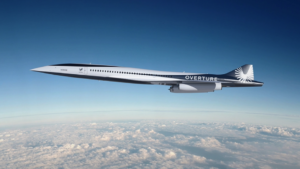Based Wasef from the Robb Report – Reports
Will Supersonic Flying Ever Take Off?
These companies think they can silence the naysayers. From Boom Supersonic to Spike Aerospace, a handful of disruptors are trying to resuscitate the genre.

Courtesy of Boom Supersonic
At its height in the early 1970s, the Concorde was the Champagne-and-caviar incarnation of supersonic travel, and it remained so until noise and emissions restrictions sunsetted the quixotic aircraft in 2003. Two decades after the Concorde’s final flight, Blake Scholl, founder and CEO of Boom Supersonic, is again extolling the potential of flying faster than the speed of sound.
Other ventures attempting to resuscitate the genre include Spike Aerospace, which is developing a supersonic corporate jet, and Lockheed Martin, which is contracted to build NASA’s X-59 for possible civilian use. Upping the ante are outfits such as Destinus and Hermeus, which aim to leave the competition behind with hypersonic velocities that quintuple the speed of sound. Yet numerous efforts have fallen back to earth, among them Aerion, once considered the supersonic industry leader, which abruptly closed its doors in 2021 after nearly 20 years of revving everyone’s hopes.

Courtesy of Spike Aerospace
Boom is also encountering headwinds, not least of which is its name. Since 1973, supersonic travel over the U.S. and Europe has been banned due to the disruptive effects of the audible blast that occurs when the sound barrier is broken. Scholl says Boom’s first aircraft, Overture, will reach Mach 1.7 on overwater flights, but over land it will fly at the subsonic speed of Mach 0.94, within existing noise regulations. Unlike the Concorde and its afterburner-capable thrusters, Boom plans to use a medium-bypass turbofan engine, dubbed Symphony, that will be outfitted with extensive noise-mitigation features.
“Now they’ve announced this unbelievable pairing of companies to develop an engine,” says aviation industry analyst Brian Foley, about the trio of Florida Turbine Technologies, GE Additive and StandardAero that Boom says will provide its propulsion solution. “That seems like a deliberate—and desperate—move to have an answer,” he adds. “Designing an engine is no easy task, especially from scratch, and it’s potentially a multibillion-dollar exercise beyond designing the plane.”
The engineering challenges of meeting 21st-century regulations for such aircraft are formidable. One industry expert, who asked to remain anonymous, described it as being “like a Rubik’s Cube—you get the yellow side, but then the blue and green go to shit”. Then there’s the most important issue: funding. Boom says it has raised only $600 million (£499) so far. “Much of the public, and even some in our industry, don’t appreciate the substantial dollars that will be required to get this thing over the top,” Foley says.
Some are quite outspoken about the chasm between the current reality and a finished aircraft. “This is nothing but a set of interesting concept drawings,” says Richard Aboulafia, a managing director at AeroDynamic Advisory, of Boom. “I just don’t see anything there, except an effort to attract money. They’ve gotten some, but by aerospace standards it’s an amusingly small amount.”
Scholl acknowledges that fundraising efforts are nowhere near his estimated need of £5 billion to £6.7 billion to bring Overture to market. But he pushes back against the naysayers: “We’ve already done things that the experts said we couldn’t do. The technology and supply chain exist. There’s no fundamental new science—every key technology in this aeroplane has already flown before.”
Even as Boom partners such as United Airlines ramp up marketing efforts around supersonic travel, industry insiders remain aware of its very daunting challenges—though they also acknowledge the allure. “Maybe that’s part of the problem,” Aboulafia says. “It’s so charismatic, it’s going to attract just enough money to linger on for a long time.”